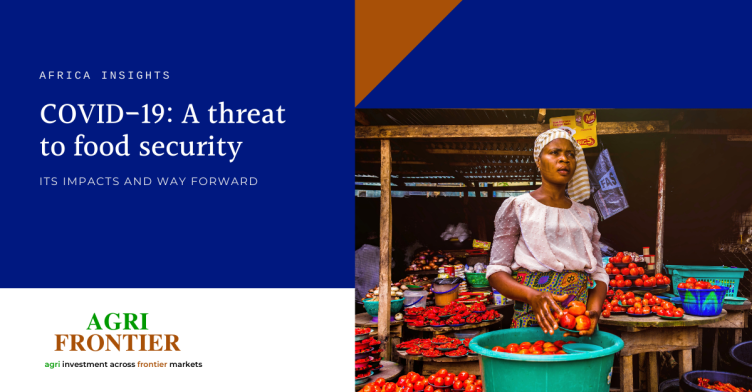Get the latest updates and learn more about Agribusiness in Africa.

19th January 23
COVID-19: A threat to food security
Food security is achieved when all people, at all times, have physical, social, and economic access to sufficient, safe, and nutritious food that meets their dietary needs and food preferences for an active and healthy life. (The Food and Agricultural Organisation)
Food security in sub-Saharan Africa has been under threat in the recent past from epidemics and successive natural disasters caused by climate change. These include locust invasion in East Africa, droughts, excessive rainfall, Cyclones Idai and Kenneth just to mention a few.
COVID-19 outbreak is the most recent pandemic having devastating impacts on the world economy both directly and indirectly. Measures have been put in place to contain the spread of the virus and while these have been critical to saving lives, they have had negative impacts on the food and agricultural sector. Supply of food products to markets and consumers both within and across borders has been disrupted. There has also been a substantial shift in the structure of demand, with collapse in demand from restaurants, hotels and catering, closure of open markets and a rise in demand from supermarkets.
These measures have both short and medium-to-long term effects to the food sector and economy at large. In the short term, there has been loss of household income, prolonged labour shortages, unavailability of key agricultural inputs such as seeds and fertilizers. In the long term and as a result, the next season’s crop is greatly affected raising food insecurity.

So, what next for Africa and the food sector? How can we take lessons learnt from COVID 19 and work to improve food security and nutrition in the continent?
Below is a review of recently published articles on the impact by COVID-19 on food insecurity in Africa, what some organisations are currently doing to alleviate this and various strategies/reforms required to address the impact in the medium to long term:
1. COVID-19: A threat to food security in Africa
Despite Africa having significant potential to be a leader in world food production, with vast land resource which is uncultivated, resourceful youth population, the continent is a huge food importer.
During the period 2016 to 2018, Africa imported about 85% of its food from outside the continent, leading to an annual food import bill of $35 billion, which is forecast to reach $110 billion by 2025. This heavy reliance on world markets is detrimental to food security, especially at a time of acute crisis. This situation has been worsened by the current COVID-19 crisis through its direct impacts on trade, logistics, production, and value chains.
COVID 19 Implications
- National policy responses to limit the impact of COVID-19 on food markets have varied, from the removal of value-added taxes on food products to export restrictions on key food items.
- Administrative restrictions imposed by governments, such as lockdowns, travel restrictions and physical distancing measures have also worsened the risk of food insecurity. These restrictions are being felt particularly strongly by low-income households and those working in the informal economy, due to their loss of livelihoods and inability to access markets
How to blunt the COVID-19 impact
- Need to build productive capacities to address underlying economic vulnerabilities, and strengthen continental capabilities to better manage food, pandemic and/or health-related crises.
- Maintaining trade links to ensure minimal disruptions to food supply by ensuring movement of food and related essential services is guaranteed among African countries.
- Commodity Diversification – Reduction of commodity dependence by African countries which has been a key factor in food insecurity.
- Full implementation of The African Continental Free Trade Area (AfCFTA) – This will enable greater economic diversification (value addition and intra-African trade), creation of jobs and revenue to fight poverty and food insecurity.
Read more in the original article
2. Food Security and COVID-19
Primary risks to food security are at the country level whereby disruptions in domestic food supply chains, other shocks affecting food production and loss of incomes and remittances are creating strong tensions and food security risks in many countries
COVID 19 Impacts
- Varying levels of food price inflation at retail level, reflecting supply chain disruptions, currency devaluations among other factors.
- High retail prices, combined with reduced incomes, means more and more households are having to cut down on quantity and quality of their food consumption, with potential lasting impacts on nutrition and health
- Food producers face large losses on perishable and nutritious food as consumption patterns shift towards cheaper staples.
The Way Forward
The World Bank is building on existing projects and deploying short and long-term financing to ensure that food systems continue to function despite challenges caused by COVID-19. These include:
- Financing initiatives aimed at meeting immediate food needs of vulnerable people, keeping domestic supply chains moving, and supporting smallholder farmers to increase food production.
- Leveraging digital platforms to transform delivery of inputs, soil testing, crop insurance, credit, extension services
- Supporting food distribution in the short term and enhancing food production in the medium term through inputs supply and irrigation
